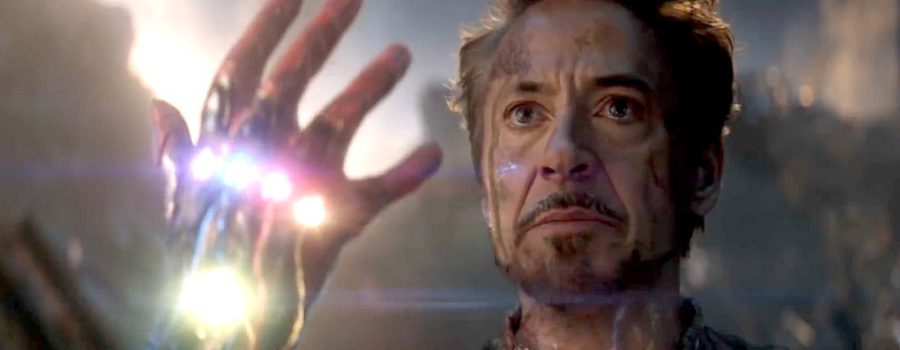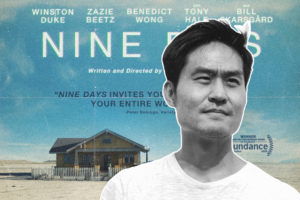Tony Stark’s (Robert Downey Jr.) death in Avengers: Endgame is the most textbook act of the endearing character’s selfish, 11-year character arc. It was meant to cap, pardon the pun, an arc kicked off in 2008 with Iron Man, spanning 23 films, juxtaposing with that of Steve Rogers’ (Chris Evans). Instead, it actually contradicts the filmmakers’ 180-degree intentions, marking a regressive decision for the egomaniacal character emblematic of some of Stark’s finest inward moments.
Egoism has always been a defining trait of Tony Stark. One of his flaws, it is something he has strived to overcome over the course of the Marvel Cinematic Universe (MCU) films. However, the audience rarely, if ever, witnesses the character make decisions outside of himself, even in Endgame. He is thoroughly selfish until the end. From as early late as 2012, in The Avengers, Stark brags about being a “Genius, playboy, billionaire, philanthropist,” when Steve Rogers questions his Avengers qualifications. From the moment he met Rogers, Stark had a grudge against him. He was threatened by Rogers’ natural leadership, strength, and the fact that he knew his father longer (and better) than he did. “That’s the guy my dad never shut up about?” Stark says, displaying a jealously towards Rogers on several levels. “I’m surprised they didn’t just keep him in ice.” It is important to note that everything that drives Stark in his life, including the grudge-match with Rogers, is a result of his father’s neglect and ultimate abandonment.
This overwhelming feeling of resentment is compounded in Captain America: Civil War in 2016, when Stark discovers that Rogers’s best friend, Bucky, or the Winter Soldier, assassinated his parents while he was brainwashed under Hydra. When Rogers defends Barnes at the end of Civil War, it gives Stark more reason to hold onto his grudge. Stark didn’t learn anything from his fight with Rogers. Apparently, all it took for Stark to realize the error of his ways was one mourning mother. For the Russo Brothers, the directors of Civil War, Avengers: Infinity War, and Endgame, Stark hearing the name of solely one of the victims of Sokovia was motive enough to transform him into “Mr. Magnanimous” overnight. It wasn’t the hundreds of thousands, nearly million lives lost at the hands of his and the Avengers’ collateral damage? In fact, taking into consideration historical context (World War II), Stark knew that Rogers wouldn’t sign the Sokovia Accords; it was a picayune jab at Rogers in the guise of virtue signaling.

In signing the Accords and becoming the new face of the government-sanctioned Avengers, Stark’s leadership over the team was formally recognized, giving him a leg up, in his narrow, ego-driven mind, in the petty grudge-match against Rogers. Signing the accord also ensured he still received the resources he desired to create new suits from the government and gained the power to lock his fellow teammates up. For Stark, it was never about protecting the country, it was about coming out on top, constantly competing to be number one in a battle he’s been fighting since he was an only child yearning for his father’s cold affection. “Sometimes, I want to punch you in your perfect teeth,” he says to Rogers in Civil War. “That shield doesn’t belong to you. You don’t deserve it! My father made that shield!” He explains to Rogers at the end of the film, still an immature, covetous character with a chip on his shoulder.
Fast-forwarding to 2019, five years before he makes his decision in Endgame to sacrifice himself to kill Thanos (Josh Brolin), Stark explains to Rogers:
“I needed you, as in past tense. That trumps what you need. It’s too late, buddy. Sorry. You know what I need? You know what I need? I need a shave. I don’t believe I ever remember telling you this … What we needed was a suit of armor around the world! Remember that? Whether it impacted our precious freedoms or not, that’s what we needed! … I said we’d lose. You said, ‘we’ll do that together too.’ Guess what, Cap? We lost, and you weren’t there. But that’s what we do, right? Our best work after the fact? We’re the Avengers. Not the Prevengers, right? … No, no, here’s my biggest point, he said … Bunch of tired old wheels! I got nothin’ for you, Cap! I’ve got no coordinates, no clues, no strategies, no options! Zero, zip, nada. No trust. Liar!”
In this desperate rant, Stark is still going on about his personal grudge after half of the population on earth was just annihilated. Reasonable perspective doesn’t seem to be a concept he’s familiar with. Personally defeated, not thinking for his team or anyone else, fresh out of space, much like in the end of Civil War, Stark’s cabin fever-fueled outburst makes Rogers appear as the centered leader on earth. When he makes the decision to sacrifice himself in Endgame, it signifies a characteristic, regressive act for Stark, feeding his ego one last time – he has the opportunity to be the ultimate, martyred hero…again, something he tried and failed to do in The Avengers. A second chance at something his father always bragged to him in regards to Rogers as a child (his father never knew Rogers was frozen, instead thinking he died a war hero). The Endgame writers and, by proxy, the Russo Brothers, think this decision wrapped up Stark’s arc neatly, from selfish to selfless:
“We realized over the course of the movies that Cap and Tony were on crossing arcs.” Endgame co-writer Stephen McFeely told Vanity Fair. “Cap, who had started as completely selfless and was jumping on grenades willy-nilly, was becoming more self-interested. Not to say selfish, but if you watch Civil War, particularly, he’s making decisions based on what he wants, even if it breaks up the Avengers. And Tony started as the brash billionaire playboy, and the stakes are growing for him, the responsibility’s growing for him. We realized at one point, late in 2015, that for Steve to be his best self, he was going to have to get a life, and for Tony to be his best self, he might have to lose his.”
The “best self” phrasing is particularly problematic considering the narrative context they’ve hammered (pardon the pun) into viewers’ minds regarding Stark and Rogers’ characters. And especially confusing since they gave Stark a new life of substance. If Stark were really choosing his best self, he wouldn’t be abandoning his young daughter and wife after creating that life for himself, knowing full well what losing one’s parents does to one’s psyche (Stark isn’t exactly the pinnacle of mental health, something the MCU failed to explore with nuance after Iron Man 3). He wouldn’t have volunteered to snap his fingers. Five years after his last inward outburst in 2019, his final words are, “I am Iron Man,” not “Tell my family I love them,” or “Look after so-and-so for me,” or anything but a sentiment built around “Me, me, me.” Further, McFeely and company entirely ignored the fact that Tony was dealing with anxiety and depression, something he was likely working through – and that should have been his best self: mental health recovery, setbacks and all – showing his kid that it’s ok to show emotion and destigmatize stoicism and mental health struggles, as even heroes endure illness in all forms.

“Tony’s battered ego becomes desperate.” Explains contributing writer for The Harvard Crimson Lanz Aaron G. Tan. “He must be proven right in Civil War — but these hot-headed emotions ultimately leave him defeated, representing his new low. So why did audiences still root for Iron Man in Endgame despite these setbacks? Nostalgia over seeing the godfather figure of the MCU back in action is surely a part of it.”
Tan brings up another essential point as to why Stark had to die: Sentimentality sells. Who wouldn’t want to see Iron Man back in action, in all of his former, endearingly pompous glory, one last time? It’s a nod to the character who provided the foundation for the MCU across 23 films. Not many fans would want to see a continued exploration into Tony Stark’s psyche, which, unfortunately, would have been far more interesting than killing him off. Retiring the suit and passing it on to someone else, like he did with Peter Parker (Tom Holland), so he could work on himself, would have been more heroic than snapping his finger and killing himself – something that another “work friend” could have done…and lived through.
“All other Avengers take up the quest to reverse Thanos’s “snap” in Avengers: Infinity War, which had decimated half the life in the universe, out of a sense of morality, having nothing else to lose, or wanting to regain something they lost.” Tan continues. “But because Tony has thrived after the snap, he’s reluctant to rejoin the Avengers. He’s driven not by a need to protect his ego now, but to protect his family, and this new interest compounds some of Tony’s fatal flaws from previous films. He’s stubborn in refusing to even contemplate rejoining the Avengers because there’s too much at risk for him.”
Towards the end of Endgame, Bruce Banner (Mark Ruffalo) already snapped his fingers and brought back half of the population of the universe. The film was over, the conflict essentially resolved. All that was needed was another snap. The writers making Stark part of Doctor Strange’s (Benedict Cumberbatch) one conceived victorious scenario was a forced device that allowed them to sneak in some dramatic effect in the midst of the exorbitant penultimate action. From a logical perspective, there was no reason for Stark to make the sacrifice other than to be the unequivocal hero in this story, in his story, especially above Rogers, in his still-narrow mind. At least three other Avengers or Guardians of the Galaxy members are powerful enough to have made the snap to disappear Thanos and his army, but Stark made the decision instead. He widowed his wife and left his daughter fatherless, understanding the consequences, simply to get that last word in the long-gestating grudge-match between Rogers and appear glorious in the most showy way. It is not the ultimate act of selflessness, it is a gross display of selfishness. If he were the true leader of the MCU, he would’ve realized that, at a certain point, being the hero means swallowing one’s pride and living to tell the story to their family. Knowing one’s limits. Being a proper father and husband. And that’s a message on which McFeely and company missed out conveying to their fans.








2 Comments
Leave your reply.